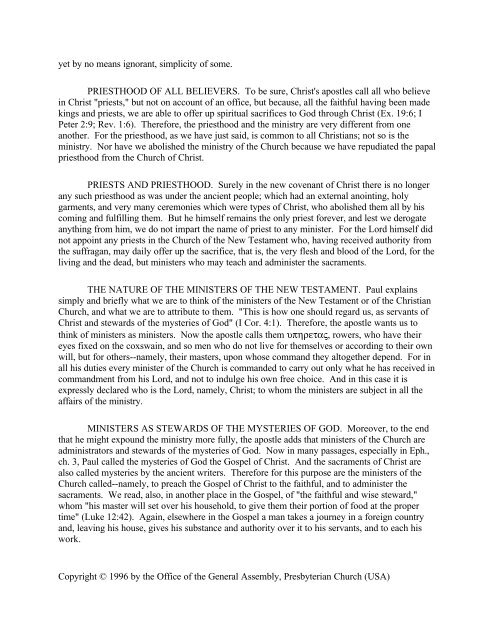The Book of Confessions - The Presbyterian Leader
The Book of Confessions - The Presbyterian Leader
The Book of Confessions - The Presbyterian Leader
Create successful ePaper yourself
Turn your PDF publications into a flip-book with our unique Google optimized e-Paper software.
yet by no means ignorant, simplicity <strong>of</strong> some.<br />
PRIESTHOOD OF ALL BELIEVERS. To be sure, Christ's apostles call all who believe<br />
in Christ "priests," but not on account <strong>of</strong> an <strong>of</strong>fice, but because, all the faithful having been made<br />
kings and priests, we are able to <strong>of</strong>fer up spiritual sacrifices to God through Christ (Ex. 19:6; I<br />
Peter 2:9; Rev. 1:6). <strong>The</strong>refore, the priesthood and the ministry are very different from one<br />
another. For the priesthood, as we have just said, is common to all Christians; not so is the<br />
ministry. Nor have we abolished the ministry <strong>of</strong> the Church because we have repudiated the papal<br />
priesthood from the Church <strong>of</strong> Christ.<br />
PRIESTS AND PRIESTHOOD. Surely in the new covenant <strong>of</strong> Christ there is no longer<br />
any such priesthood as was under the ancient people; which had an external anointing, holy<br />
garments, and very many ceremonies which were types <strong>of</strong> Christ, who abolished them all by his<br />
coming and fulfilling them. But he himself remains the only priest forever, and lest we derogate<br />
anything from him, we do not impart the name <strong>of</strong> priest to any minister. For the Lord himself did<br />
not appoint any priests in the Church <strong>of</strong> the New Testament who, having received authority from<br />
the suffragan, may daily <strong>of</strong>fer up the sacrifice, that is, the very flesh and blood <strong>of</strong> the Lord, for the<br />
living and the dead, but ministers who may teach and administer the sacraments.<br />
THE NATURE OF THE MINISTERS OF THE NEW TESTAMENT. Paul explains<br />
simply and briefly what we are to think <strong>of</strong> the ministers <strong>of</strong> the New Testament or <strong>of</strong> the Christian<br />
Church, and what we are to attribute to them. "This is how one should regard us, as servants <strong>of</strong><br />
Christ and stewards <strong>of</strong> the mysteries <strong>of</strong> God" (I Cor. 4:1). <strong>The</strong>refore, the apostle wants us to<br />
think <strong>of</strong> ministers as ministers. Now the apostle calls them υπηρετας, rowers, who have their<br />
eyes fixed on the coxswain, and so men who do not live for themselves or according to their own<br />
will, but for others--namely, their masters, upon whose command they altogether depend. For in<br />
all his duties every minister <strong>of</strong> the Church is commanded to carry out only what he has received in<br />
commandment from his Lord, and not to indulge his own free choice. And in this case it is<br />
expressly declared who is the Lord, namely, Christ; to whom the ministers are subject in all the<br />
affairs <strong>of</strong> the ministry.<br />
MINISTERS AS STEWARDS OF THE MYSTERIES OF GOD. Moreover, to the end<br />
that he might expound the ministry more fully, the apostle adds that ministers <strong>of</strong> the Church are<br />
administrators and stewards <strong>of</strong> the mysteries <strong>of</strong> God. Now in many passages, especially in Eph.,<br />
ch. 3, Paul called the mysteries <strong>of</strong> God the Gospel <strong>of</strong> Christ. And the sacraments <strong>of</strong> Christ are<br />
also called mysteries by the ancient writers. <strong>The</strong>refore for this purpose are the ministers <strong>of</strong> the<br />
Church called--namely, to preach the Gospel <strong>of</strong> Christ to the faithful, and to administer the<br />
sacraments. We read, also, in another place in the Gospel, <strong>of</strong> "the faithful and wise steward,"<br />
whom "his master will set over his household, to give them their portion <strong>of</strong> food at the proper<br />
time" (Luke 12:42). Again, elsewhere in the Gospel a man takes a journey in a foreign country<br />
and, leaving his house, gives his substance and authority over it to his servants, and to each his<br />
work.<br />
Copyright © 1996 by the Office <strong>of</strong> the General Assembly, <strong>Presbyterian</strong> Church (USA)




